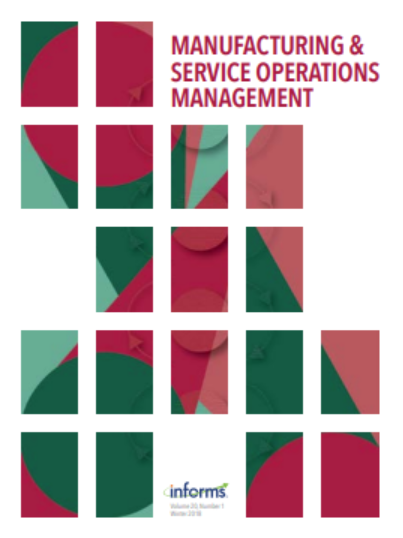Operational Transparency: Showing When Work Gets Done
IF 4.8
3区 管理学
Q1 MANAGEMENT
M&som-Manufacturing & Service Operations Management
Pub Date : 2023-05-01
DOI:10.1287/msom.2020.0899
引用次数: 11
Abstract
Problem definition: Do the benefits of operational transparency depend on when the work is done? Academic/practical relevance: This work connects the operations management literature on operational transparency with the psychology literature on the peak-end effect. Methodology: This study examines how customers respond to operational transparency with parcel delivery data from the Cainiao Network, the logistics arm of Alibaba. The sample comprises 4.68 million deliveries. Each delivery has between 4 and 10 track-package activities, which customers can check in real time, and a delivery service score, which customers leave after receiving the package. Instrumental-variable regressions quantify the causal effect of track-package-activity times on delivery scores. Results: The regressions suggest that customers punish early idleness less than late idleness, leaving higher delivery service scores when track-package activities cluster toward the end of the shipping horizon. For example, if a shipment takes 100 hours, then delaying the time of the average action from hour 20 to hour 80 increases the expected delivery score by approximately the same amount as expediting the arrival time from hour 100 to hour 73. Managerial implications: Memory limitations make customers especially sensitive to how service operations end. History: This paper has been accepted as part of the 2018 MSOM Data Driven Research Challenge.操作透明度:显示工作何时完成
问题定义:操作透明度的好处是否取决于工作何时完成?学术/实践相关性:本研究将运营透明度的运营管理文献与峰端效应的心理学文献联系起来。研究方法:本研究通过阿里巴巴旗下物流公司菜鸟网络的包裹递送数据,考察客户对运营透明度的反应。样本包括468万次交付。每次送货都有4到10个跟踪包裹的活动,顾客可以实时查看这些活动,还有一个送货服务评分,顾客在收到包裹后会留下评分。工具变量回归量化了跟踪包裹活动时间对递送分数的因果影响。结果:回归表明,顾客对早期闲置的惩罚比对后期闲置的惩罚要少,当跟踪包裹活动聚集在运输地平线的末端时,配送服务得分更高。例如,如果发货需要100个小时,那么将平均动作的时间从20小时延迟到80小时将增加预期交付分数,其数量与将到达时间从100小时加快到73小时大致相同。管理含义:内存限制使客户对服务操作如何结束特别敏感。历史:本文已被接受为2018年MSOM数据驱动研究挑战赛的一部分。
本文章由计算机程序翻译,如有差异,请以英文原文为准。
求助全文
约1分钟内获得全文
求助全文
来源期刊

M&som-Manufacturing & Service Operations Management
管理科学-运筹学与管理科学
CiteScore
9.30
自引率
12.70%
发文量
184
审稿时长
12 months
期刊介绍:
M&SOM is the INFORMS journal for operations management. The purpose of the journal is to publish high-impact manuscripts that report relevant research on important problems in operations management (OM). The field of OM is the study of the innovative or traditional processes for the design, procurement, production, delivery, and recovery of goods and services. OM research entails the control, planning, design, and improvement of these processes. This research can be prescriptive, descriptive, or predictive; however, the intent of the research is ultimately to develop some form of enduring knowledge that can lead to more efficient or effective processes for the creation and delivery of goods and services.
M&SOM encourages a variety of methodological approaches to OM research; papers may be theoretical or empirical, analytical or computational, and may be based on a range of established research disciplines. M&SOM encourages contributions in OM across the full spectrum of decision making: strategic, tactical, and operational. Furthermore, the journal supports research that examines pertinent issues at the interfaces between OM and other functional areas.
 求助内容:
求助内容: 应助结果提醒方式:
应助结果提醒方式:


